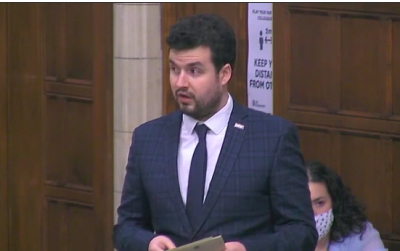Beddington Lane ‘dumping ground’ of South London due to incinerator presence
During a debate between six MPs and Environment Minister Rebecca Pow in Parliament on the afternoon of 12 January, Elliot Colburn MP pushed for the need to ‘look further up the waste hierarchy’ to reduce the need for incineration across the UK.
 Colburn opened the debate by raising concerns that, due to the presence of the Energy from Waste (EfW) facility on Beddington Lane, a suburban settlement in his constituency of Carshalton and Wallington, Sutton had become a ‘dumping ground’ for south London in its waste strategy – with Sutton taking more than half of the waste (700,000 tonnes) amassed by four London boroughs.
Colburn opened the debate by raising concerns that, due to the presence of the Energy from Waste (EfW) facility on Beddington Lane, a suburban settlement in his constituency of Carshalton and Wallington, Sutton had become a ‘dumping ground’ for south London in its waste strategy – with Sutton taking more than half of the waste (700,000 tonnes) amassed by four London boroughs.
Moving to address the wider impact of incinerators on recycling rates in the UK, Colburn continued by stating that the rate of incineration has risen from 12-44 per cent in the past decade, with research finding that incineration has a negative relationship with recycling rates.
Citing research from Zero Waste Europe, he stated that more than 90 per cent of materials that end up in landfill or being incinerated could be recycled.
Pointing out that EfW needs waste to be an effective business model, Colburn urged the Government to move ‘at pace’ towards a circular economy and ‘look further up the waste hierarchy’, commenting that the solution lies in reducing waste altogether and preventing recyclable waste from incineration.
Similar sentiments followed Colburn’s statement, with Jane Hunt MP raising concerns about the impacts of incinerators on the environment and the health of residents in her constituency of Loughborough.
Robbie Moore MP proffered incineration and landfill taxes as a solution, raising concerns about air pollution from the incinerator itself and from increased traffic flows from transporting waste negatively affecting the respiratory health of his constituents in Montgomeryshire. Moore mirrored Colburn’s sentiment, pushing for any government policy to primarily consider the waste hierarchy.
According to Shlomo Dowen, National Coordinator of the UK Without Incineration Network (UKWIN): "Study after study has found that most of what we are sending for incineration could have been recycled or composted.
“Rather than allowing new incinerators to be built, we need action to stop this terrible waste of resources that comes with such serious adverse environmental consequences."
Following the debate, Executive Director of the Environmental Services Association, Jacob Hayler, commented: “The recycling and waste management sector has played a leading role in significantly improving national recycling performance over the past two decades and ESA members have invested billions in the UK’s circular economy during that time – helping the British public not only to recycle more than ever, but also to divert millions of tonnes of non-recyclable waste from landfill, avoiding significant greenhouse gas emissions.
"The role of energy recovery in the UK’s waste management system has been well debated for many years and we believe that consideration is best now given to upstream interventions that seek to limit the volume and type of materials entering the residual waste stream in the first place – particularly those which could and should be recycled.
"If we can get these upstream interventions right, which includes getting consumers to play their essential role in this system too, the debate around energy from waste becomes moot.”







